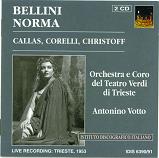This recording finds Callas at her most vocally secure and powerful, absolutely fearless throughout her entire range, with coloratura spotless and, as usual, her attention to the text deeply probing. The 1955 performance available on Opera d’Oro remains supreme, however; there you find a better mixture of warrior and woman in the character, whereas here the warrior prevails.
That’s not to say this set isn’t remarkable–we just happen to have an embarrassment of riches. And among the other riches here are the Pollione of Franco Corelli and the Oroveso of Boris Christoff. With regard to the former, we have a voice of such magnificence that it’s easy to see why every girl Druid in town wants him; and as far as Christoff is concerned, although stylistically he seems to be in the wrong opera, we can finally understand where Norma gets her strength, her convictions, her temper. Elena Nicolai is an Adalgisa of stature, in keeping with the general grandeur of the performance. Antonino Votto’s leadership is rum-tum-tum. The sound is terrible and occasionally a few measures of music are missing; but the voices come through. You’ll know if you need this.
































